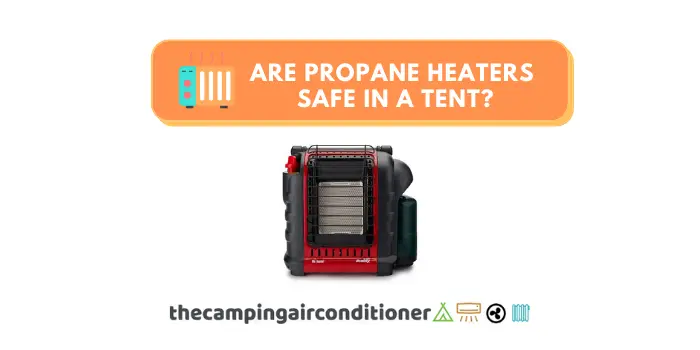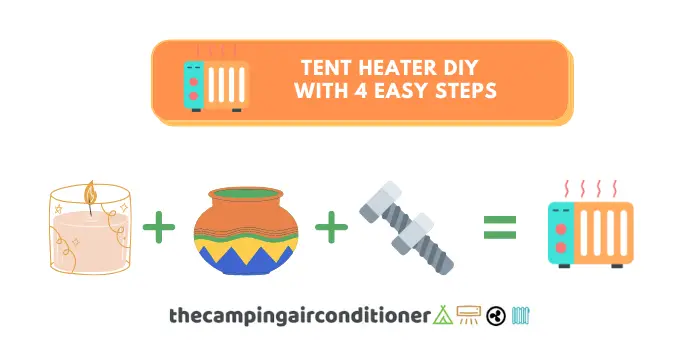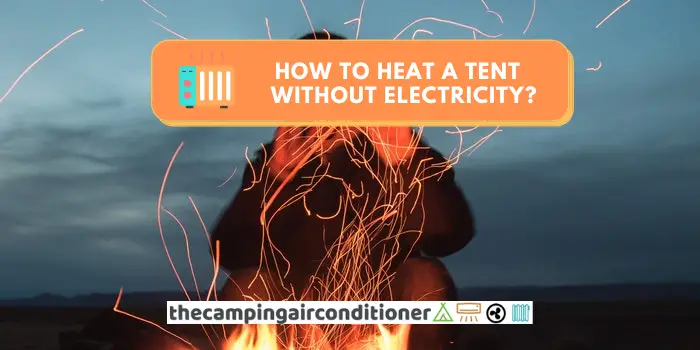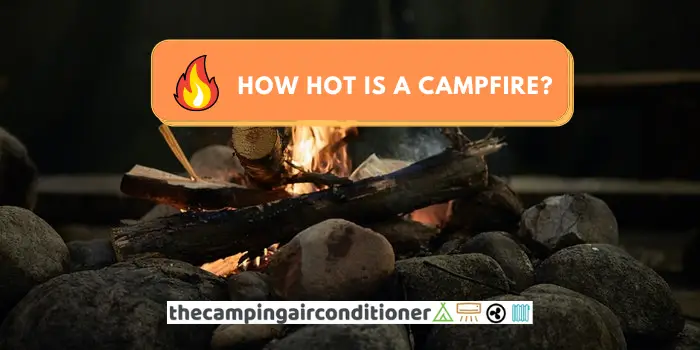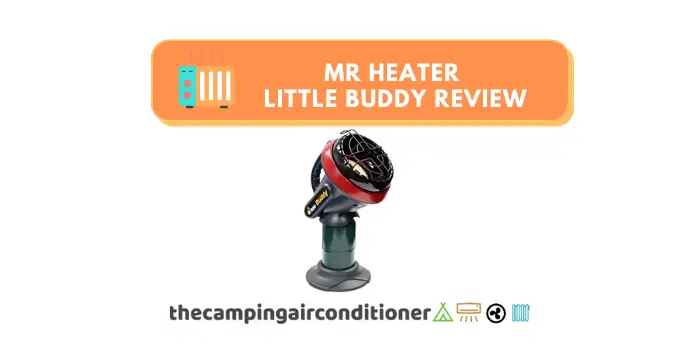Winter camping is a good alternative for those who love empty parks and peaceful environments – campsites are less crowded, and there are plenty of opportunities to enjoy nature. However, one of the biggest challenges associated with camping during the cold season is heating your tent.
Many people get confused with many heating device options in the market, and a classic question is raised – what kind of heater can be used in a tent? Overall, you can find the following heating alternatives for your camping adventures:
- Propane Heaters (gas heater)
- Butane Heaters (gas heater)
- Kerosene Heaters (liquid heater)
- Electric Heaters
- DIY Tent Heater (Candle Heater)
Each comes with benefits and drawbacks and will better suit different camping conditions. Let’s go through the details of each heating option below and see what works for you the best.
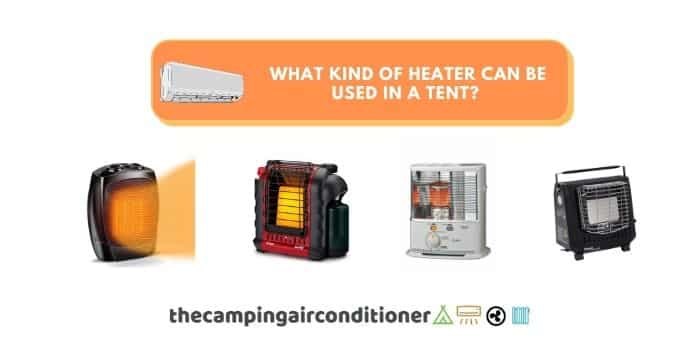
Tent heaters - Pros and Cons of each type
Propane Heaters
When released from the pressured bottles under air pressure conditions, the liquid becomes a gas again. Because of its ease of transportation, storage, and high energy density, propane is widely used as input for portable heating devices, and many campers adore this heating alternative.
Apart from its ease of handling and portability, propane heaters are usually cheaper than other alternatives, tend to operate at high-efficiency levels, and requires no battery or electrical input (great for campsites without electrical infrastructure).
On the other hand, when used in tents, there are risks associated with its use, such as carbon monoxide poisoning, depletion of oxygen levels, and you may encounter overheating issues.
To mitigate these risks, we recommend ALWAYS ensuring that your device has:
- Carbon monoxide detectors (if they do not have, you can buy a battery-powered device)
- Auto-shutoff mechanisms for overheating and tipping over
- Always checking whether your preferred device complies with the American National Standards Institute requirements (ANSI Z21.103-2017)
Pros
- Safe mechanisms
- Easy storage, handling and transportation
- Requires no battery or electricity
- Efficient combustion
- Affordable option
- Works in extreme cold weather.
Cons
- Risks associated with carbon monoxide poisoning, overheating, oxygen depletion levels.
Our product recommendation - Propane Heater
Most efficient portable propane – best value for money
Butane Heaters
It is normally sold in canisters, stored under pressure as a liquid, and becomes gas when released into the air. Butane is an excellent alternative for campers, given its price (cheaper than propane), ease of transportation, and instant temperature increase – butane quickly reaches high temperatures.
Because of this, this gas is widely used in camping stoves and is the preferred solution for cooking.
All these advantages at a cost, though. Butane might not work in low temperatures – its boiling point is around -2 degrees Celsius (28.4 Fahrenheit). Therefore, it won’t work in freezing camping conditions, as the low temperatures will not allow the liquid inside canisters to turn into gas.
Pros
- Easy storage, handling and transportation
- Cheap and efficient
- Requires no battery or electricity
- Provide instant temperature increase
- Butane burns cleaner and does not produce as much CO as propane.
Cons
- Not ideal for camping in extreme cold
Suggested Article
Kerosene Heaters
Kerosene is made from petroleum, and it is a highly flammable liquid (conversely to propane and butane). One of its main characteristics is its not so pleasant odour. Kerosene is a broadly known fuel used, and it has been used in the aviation industry for many years thanks to its low freezing point (it is able to keep low viscosity levels inside aeroplanes’ tanks).
Compared to propane, kerosene heaters offer less moisture and are much more efficient (they produce more heating output per gallon – approximately 47%).
Other advantages of this fuel are: it produces fewer fumes, releases fewer toxins in the environment (more environment friendly than gas heaters), is easy and safe to store, and it is cheap (even though prices are highly correlated to oil prices, varying periodically).
On the flip side, kerosene is hard to recycle, produces more carbon monoxide than propane and butane, as previously discussed, releases a bad smell.
Pros
- More efficient than propane and butane
- Releases less toxins
- Easy and safe to store
- Highly efficient
- Does not require electricity
Cons
- Produces more carbon monoxide than propane and butane
- Releases unpleasant odor
Our product recommendation - Propane Heater
Lightweight and portable kerosene tent heater Sengoku Heat Mate 10,000 BTU
Electric Heaters
Among its advantages, electric heaters can bring temperatures up reasonably quickly, have compact models for tent heating, and come at an affordable price. Further, it produces no fumes nor carbon monoxide and operates within low noise levels.
Despite all these features, they need to run on electricity, which might turn them into an unfeasible option if your campsite does not have a proper electrical infrastructure (or you can buy a solar panel and portable battery to power it). In addition, they can consumer large amounts of energy during the heating process.
Pros
- Do not produce carbon monoxide
- Quick temperature rise
- Affordable
- Low noise levels
Cons
- Needs electricity
- Consumes large amounts of energy
Our product recommendation - Propane Heater
Compact Electric Heater – Dreo Space Heater (1500W)
DIY Tent Heater
Many DIY tent heater options are available, but we like the candle heater version. It is simple, cheap, safe and easy to make, and you will only need the following material:
- Tea light candles
- 2 different sized clay planting pots
- Cement blocks, bricks, glass pans, or muffin tin to act as a steady base.
- 1 large bolt, washers, or bolts (approximately 5-inches)
If you want to learn how to assemble it, read the article below.
FAQ
What is the best type of tent heater?
In short, our answer is – it depends! Overall, we recommend the following:
- Safest heater option – Electric Heaters
- Most reliable and great alternative for campers – Propane Heaters (gas heater)
- Versatile (suitable for cooking as well) – Butane Heaters (gas heater)
- Most Powerful (for huge tents) – Kerosene Heaters (liquid heater)
- Budget-Friendly – DIY Tent Heater (Candle Heater)
A couple of caveats and reminders:
What is the difference between propane and butane heaters?
The significant difference between propane and butane is their boiling points. Propane’s boiling temperature is -42°C (-43.6°F), whereas butane is -2°C (28.4°F).
Is it safe to leave my tent heater on overnight?
No, we DO NOT recommend you sleeping with your propane heater turned on overnight. There are several risks associated with carbon poisoning and depletion of oxygen levels.
Furthermore, overheating can melt your tent or cause a fire.
How many BTU do I need for a tent?
As a rule of thumb, we recommend using the formula detailed below.
(Temperature Increase) x (Tent Volume) x 0.25 = BTUs heater output.
Where:
- Tent Size – volume (area x height – in cubic feet)
- Desired temperature increase (in Fahrenheit degrees)
How to keep my tent warm without electricity?
We have prepared ten tips to help you keep your tent warm without electricity in this article – How to heat a tent without electricity? (thecampingairconditioner.com)
Conclusion
We hope that by the end of this article you have a better understanding of tent heaters and what kind of heater can be used in a tent.
The best heating option will vary according to your needs and preferences. Overall, we prefer electrical and propane options.
Sources:
The Difference Between Electric, Gas, and Propane Heaters – HomeSelfe
What are Propane Heaters? (with pictures) (wise-geek.com)
What is Propane Gas – Uses, Properties + More – Elgas
What’s the difference between propane, butane, and methane? | Ferrellgas | Fuel Life Simply
Butane – The Perfect Fuel for Camping and Caravanning – Butane Source
What low temperature will my butane bottle stop working at? (gasit.co.uk)


